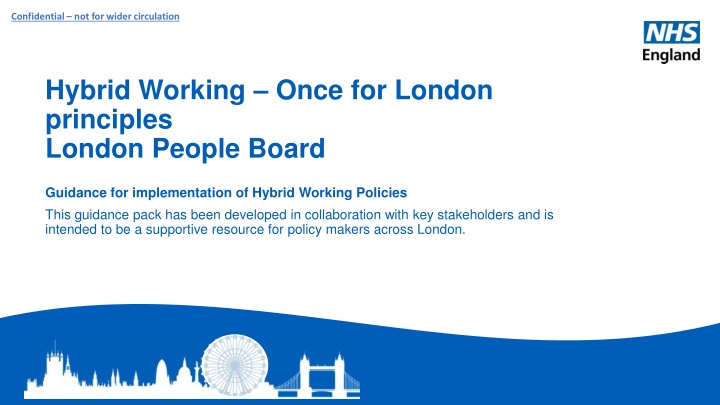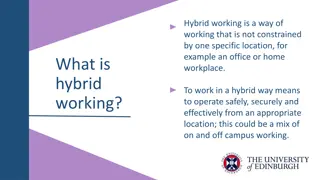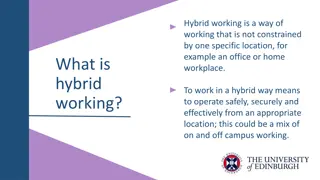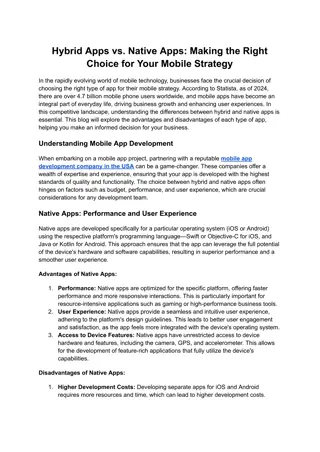
Insights into Hybrid Working Policies in London
"Discover key insights and challenges in implementing hybrid working policies in London, including trends, legal considerations, and employee sentiments. Learn how organizations are adapting to a new era of work flexibility for increased productivity and satisfaction." (Characters: 261)
Download Presentation

Please find below an Image/Link to download the presentation.
The content on the website is provided AS IS for your information and personal use only. It may not be sold, licensed, or shared on other websites without obtaining consent from the author. If you encounter any issues during the download, it is possible that the publisher has removed the file from their server.
You are allowed to download the files provided on this website for personal or commercial use, subject to the condition that they are used lawfully. All files are the property of their respective owners.
The content on the website is provided AS IS for your information and personal use only. It may not be sold, licensed, or shared on other websites without obtaining consent from the author.
E N D
Presentation Transcript
Confidential not for wider circulation Hybrid Working Once for London principles London People Board Guidance for implementation of Hybrid Working Policies This guidance pack has been developed in collaboration with key stakeholders and is intended to be a supportive resource for policy makers across London.
Hybrid Working common themes Background Stakeholders from across London have approached the London People Board and NHSE London Workforce, Training and Education function for some once for London principles to support future development of Hybrid Working policies. Our analysis has identified common themes and challenges for employers and staff. It is hoped that the insights provided will support organisations in London to determine their local policies, with a focus on equity, effective service delivery and staff experience. Some of the common themes for consideration Mandated face-to- face attendance and High Cost Area Supplement (HCAS) Legal guidance, equity, TU and wider staff engagement Hybrid working for clinical staff Flexible working, retention and staff experience Office space constraints
Comparison with other industries Decline in Fully Remote Roles and Rise in Hybrid Roles Employee Sentiment & Considerations Technology & Office Space Investments Mandated Attendance Between Jan 21 and Jan 22 there was a steep decline in fully remote working and 64% of UK companies no longer offer fully remote roles. Since then, fully remote working in the UK labour force has remained around the 13-14% mark. The steep decline in fully remote working has been matched by an equally steep increase in hybrid working and the average time hybrid workers work at home is now two days. Hybrid working began to significantly increase from Jan 22 and many employees who worked fully remote during the pandemic now work a hybrid work pattern. As at October 2024, 41% of UK employees work either a fully remote or hybrid work pattern (13% and 28% respectively). HSBC and Barclays have mandated that employees attend the office for at least three days per week. PwC policy requires staff to spend at least three days a week (or 60% of their time) with clients or in the office. (track employee locations to monitor compliance) Boots has asked staff to attend the office five days a week by Sept because of the perceived impact on organisational culture Legal advice suggests that blanket approaches cannot legally prevent employees from making an individual request that varies from any mandated attendance. The policy itself cannot be used as a reason to turn down an individual request (see legal context slide) Surveys continue to show strong employee preferences for hybrid and remote work particularly among graduates who now value flexible working as much they do salary levels Employees report feeling more productive when working remotely, thanks to fewer interruptions and reduced commute times. Employees working from home felt they had more control over their time and could focus better on tasks. Employees value in-person interactions for collaboration, networking, and team cohesion. 28% of employees missed spontaneous office conversations and felt disconnected from their colleagues while working remotely Most cited issues around a lack of clarity on hybrid work policies There are trends towards incorporating wellness-centric office designs, such as biophilic elements (plants and natural lighting) and smart technologies for better office management Hybrid working has enabled UK businesses to cut energy usage by a fifth as they replace large city centre office space with smaller, more energy efficient spaces Investment in working environments increases employee satisfaction and provides positive reinforcement to office attendance.
Issues around equity and consistency: All organisations will have different requirements, however there may be an issue around equity/attraction/retention if neighbouring organisations apply different hybrid working policies All new policies should be supported by an equality impact assessment and trade union and staff network engagement There may be challenges from staff groups if they feel they are being offered less flexibility than others without a clear rationale, the legal advice is clear on the need to address issues from staff carefully, and often individually Analysis has shown that there is already a lot of consistency in policies across London, but that some employers are yet to address the issue, hence the request for some principles to support employers who are considering their local approach
Legal Context (see further detail in the appendices) New flexible working laws came into force on April 6, 2024, giving employees the right to request flexible working from their first day of employment. The legislation includes the following: Employees have a right to make two requests per year for changes to hours, times or place of work Employees do not need to give a reason for their request Employees have a right to be consulted with if employers do not think they can make the changes Employers can only refuse a request for the reasons set out in the legislation ( a permitted business reason ) Employers must respond to requests within two months Employees have a right to complain up to employment tribunal level if they disagree with an employer s decision
Higher Cost Area Supplement (HCAS) - - HCAS presents a specific challenge for London in relation to hybrid working Employers need to stipulate a minimum requirement of office/in-person working to be paid HCAS, there is no national steer on what the minimum requirement is It is important to make the distinction between mandated office time to secure HCAS payment, and time required to meet the hybrid working policy to support business delivery. This distinction should be explicit in employer policies. NCL system have agreed a system-wide minimum of 1 day office/face-to-face working to receive HCAS. Employers within the system overlay their local policy which cannot go below 1 day, but can require more The NCL system average requirement is 2 days Other London employers who have introduced a policy have stipulate 2 or 3 days. Clearly for many clinical and other service-related roles, the requirement for face-to-face working is higher/100% due to the nature of work being delivered - - - -
Draft hybrid working principles for London Flexible Implementation Consistency across London Policies should include a structured process to evaluate whether a role is suitable for hybrid working, balancing service/business needs with staff choice All NHS London provider organisations should have a clear hybrid working policy in place for their staff, recognising the distinction with HCAS requirements, and the impact of hybrid working on organisational culture, flexible working and equality. Provider organisations are encouraged to embrace hybrid working as part of flexible working, but have local autonomy in determining specific minimum on-site attendance requirements Organisations should be aware that the average time requirement for hybrid working across London is 2 days/40% office or face-to-face working requirement (excluding those whose roles require specific face-to-face time). Organisations should still continue to offer home working contracts where there is justification in terms of business needs, skills requirements or personal circumstances of the employee. Organisations should consider the policies of other NHS organisations in London when implementing their own policies, to maintain stability and create equity Alignment with National Frameworks Engagement and equity Policies should align with Sections 33 and 35 of the TCS handbook, ensuring that flexible working requests and contractual base designations are handled in accordance with national guidance. Policies should be developed in partnership with Trade Union representatives and staff networks, ensuring that staff voices are heard, and equality impact assessments are conducted to address potential concerns or inequalities Operational Considerations Policies should consider estate requirements and availability, along with technical infrastructure required to support hybrid working within and outside of the office/work environment
Hybrid Working Policies Across London Support and Well-being Employee Engagement and Communications Ensure staff have access to adequate technical support for hybrid working systems and consider appropriate reimbursement for hybrid or homeworking-related costs. Implement a formalised process for flexible working requests under Section 33 of the TCS handbook, ensuring decisions are transparent and outcomes are recorded on ESR (Electronic Staff Record). Equality, Diversity, and Inclusion (EDI) Clearly communicate expectations through internal communications for hybrid working arrangements, including guidelines for office attendance and availability during remote working. Conduct equality impact assessments to ensure hybrid working arrangements do not disadvantage people with protected characteristics. Where potential impact is identified, develop clear actions plans to mitigate the risk of discrimination or inequity. Managerial Guidance Recognise and promote the role of hybrid working policies in improving recruitment and retention, offering flexibility that aligns with emerging workforce expectations. Equip managers with training and tools to effectively implement and oversee hybrid working arrangements, including performance reviews and team engagement strategies. Supporting learners and education Organisational should consider how education programmes and the needs of learners on placement are being met in the context of hybrid working Use standardised tools like the Homeworking Checklist or Role Mapping Checklist to guide decision-making on individual hybrid working requests.
Summary These principles have been circulated to key stakeholders and will be reviewed periodically by the London People Board. For more information or to get in touch about any of the resources provided, please contact england.wtedelivery.london@nhs.net Thank you for your engagement.
Appendices 10 |
Legal Context New flexible working laws came into force on April 6, 2024, giving employees the right to request flexible working from their first day of employment. The legislation includes the following: Employees have a right to make two requests per year for changes to hours, times or place of work Employees do not need to give a reason for their request Employees have a right to be consulted with if employers do not think they can make the changes Employers can only refuse a request for the reasons set out in the legislation ( a permitted business reason ) Employers must respond to requests within two months Employees have a right to complain up to employment tribunal level if they disagree with an employer s decision
Legal Context continued Organisations may consider setting a set number of days that all staff are expected to be onsite, but this would be subject to the following: The policy must allow for individual requests that vary from the standard level as employees retain this statutory right. Any policy which sets an organisation wide standard will need to clearly provide for individual requests to be considered. The legislation, which is due to be bolstered in 2025, dictates that each case must be looked at on its own merits including individual consultation before refusal. Refusal can only be for the reasons outlined in the legislation as applied to each individual case. The organisation would need to demonstrate through consultation that any overarching permitted business reason quoted in policy applied to the individual case. There has been concern about difference in decisions for similar job roles in different parts of an organisation. The legal advice is that it is fair to look at each case on its own merits at a particular time and that services have different pressures at different times. The legislation supports organisations being able to defend local differences, connecting local circumstances and conditions to a permitted business reason . To help mitigate the risk of challenge, managers should review flexible working requests at least on an annual basis. This would allow reconsideration of any decisions that are inconsistent.
Contractual Context Section 33 of NHS Terms and Conditions provides for all statutory rights and includes additional enhanced provisions as follows: Employers must take steps to encourage flexible working. Employees have a right to make an unlimited number of requests per year for changes to hours, times or place of work An escalation stage if managers are unable to reach agreement with the employee (n.b. this is not the appeal stage). Employers are asked to consider alternative roles as part of this escalation stage An appeal stage if the organisation is unable to agree the request (the statutory two-month response time includes any appeal) Employers must record, monitor and report on requests Employers must have a separate Carers Policy covering flexible working in relation to child and dependent care
Evidence to support Research findings and recommendations for implementing hybrid working from Birmingham University Study indicating that more than 40% of companies anticipate over half their workforce will work regularly from home in the future. https://www.birmingham.ac.uk PricewaterhouseCoopers survey where 57% of respondents reported improved performance and productivity over the past 12 months due to remote and hybrid working, while only 4% noted a significant decline. pwc.com For a comprehensive analysis of the impact of remote and hybrid working on workers and organisations, you may refer to the UK Parliament's research briefing. post.parliament.uk 14 |






















